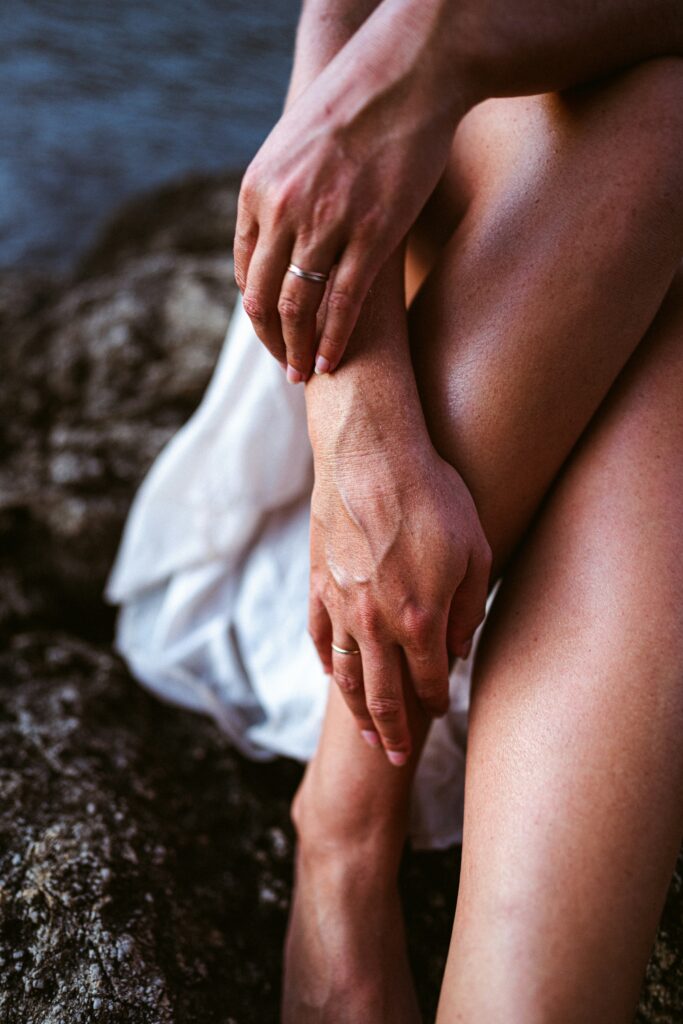The Search for the Perfect Anti-Aging Ingredient
Have you ever found yourself torn between the promise of retinol’s scientifically backed anti-aging power and the allure of bakuchiol’s gentler, plant-based approach? With the rise of “clean beauty,” bakuchiol has been hailed as a natural retinol alternative, but does the research support these claims?
Retinol has long been dermatology’s gold standard for reducing fine lines, stimulating collagen production, and improving skin texture. However, its common side effects—redness, peeling, and increased sun sensitivity—have left many searching for an alternative. Bakuchiol, a botanical extract from Psoralea corylifolia, claims to offer similar benefits without irritation. But does the science back it up?
In this deep dive, we’ll compare these two powerful skincare ingredients at a molecular level, analyze clinical studies, and discuss their risks and benefits. If you’ve ever wondered which one is best for your skin type and concerns, this guide is for you.
- The Search for the Perfect Anti-Aging Ingredient
- The Science Behind Retinol
- What is Bakuchiol? A Natural Retinol Alternative?
- The Science of Retinol vs. Bakuchiol: Head-to-Head Comparison
- The Drawbacks of Bakuchiol: Is It Overhyped?
- Who Should Use Which? Personalized Recommendations
- How to Use Retinol and Bakuchiol for Maximum Results
- So Which One Wins?

The Science Behind Retinol
What is Retinol?
Retinol is a vitamin A derivative that belongs to the retinoid family, which includes prescription-strength forms like tretinoin. It has been extensively studied for its ability to increase collagen production, speed up cell turnover, and improve skin texture.
Unlike retinoic acid (tretinoin), which works immediately, retinol requires conversion within the skin:
- Retinol → Retinaldehyde (via enzymes in the skin)
- Retinaldehyde → Retinoic Acid (active form that affects gene expression)
Once in its active form, retinoic acid binds to retinoid receptors (RARs) in skin cells, initiating a cascade of processes that:
- Increase collagen and elastin synthesis, making the skin plumper and firmer.
- Boost epidermal renewal, leading to smoother, more even skin tone.
- Inhibit melanin production, reducing dark spots and hyperpigmentation.
- Regulate oil production, preventing clogged pores and breakouts.
Clinically Proven Benefits of Retinol
Scientific evidence overwhelmingly supports retinol’s effectiveness. A 12-week study found that 0.3% and 0.5% retinol serums significantly reduced fine lines and improved skin elasticity.
✅ Reduces Wrinkles & Fine Lines
- Retinol stimulates fibroblasts, the cells responsible for producing collagen and elastin, keeping the skin youthful.
✅ Fades Hyperpigmentation & Sun Damage
- Retinol inhibits tyrosinase, an enzyme that produces excess melanin, making it effective for age spots and post-inflammatory hyperpigmentation (PIH).
✅ Unclogs Pores & Controls Acne
- By regulating keratinocyte turnover, retinol prevents dead skin cells from clogging pores, reducing acne breakouts.
✅ Improves Skin Texture & Radiance
- It speeds up cell turnover, bringing fresh, new cells to the surface faster.
The Downsides of Retinol
While retinol is one of the most researched anti-aging ingredients, it comes with potential drawbacks.
⛔ Skin Irritation & Redness: Retinol disrupts the skin barrier initially, leading to dryness, flaking, and sensitivity.
⛔ Increased Sun Sensitivity: Retinol thins the stratum corneum in early use, making the skin more vulnerable to UV damage if sunscreen is not applied.
⛔ Not Safe During Pregnancy: Retinoids are teratogenic (harmful to fetal development), making them unsafe for pregnant or breastfeeding individuals.
⛔ Requires a Gradual Introduction: Dermatologists recommend starting with low concentrations (0.1%-0.3%), applying every other night before increasing frequency.
Despite these downsides, proper usage (hydration, buffering, and SPF) can minimize irritation while maximizing retinol’s benefits.
What is Bakuchiol? A Natural Retinol Alternative?
Understanding Bakuchiol: The Science Behind the Hype
Unlike retinol, bakuchiol is not a vitamin A derivative. Instead, it is extracted from the seeds and leaves of Psoralea corylifolia. Despite no structural similarity to retinol, bakuchiol mimics its effects by activating similar cellular pathways involved in collagen production and skin renewal.
A 2022 study published in the Journal of Cosmetic Dermatology reported that bakuchiol regulates genes associated with retinoic acid activity, leading to:
- Increased collagen and elastin production (firmer skin, reduced wrinkles)
- Enhanced cell turnover (brighter complexion, smoother texture)
- Reduced inflammation and oxidative stress (soothes redness and irritation)
- Antibacterial effects against Cutibacterium acnes (improves acne-prone skin)
Bakuchiol’s Clinical Benefits: How It Compares to Retinol
- Wrinkle Reduction: A 12-week study comparing 0.5% bakuchiol and 0.5% retinol found similar wrinkle-reducing effects, but bakuchiol users had fewer side effects.
- Sun Safety Advantage: Unlike retinol, bakuchiol does not make skin more sun-sensitive, allowing for morning and evening application.
- Anti-Inflammatory Effects: Reduces redness, irritation, and acne, making it ideal for sensitive skin types.
- Hyperpigmentation Reduction: Inhibits melanin production, helping fade dark spots, acne scars, and uneven skin tone.
The Advantages of Bakuchiol Over Retinol
But does this mean bakuchiol is better than retinol? Not necessarily. While promising, bakuchiol lacks the decades of research supporting retinol’s long-term anti-aging effects. Some studies also suggest that bakuchiol may be less effective for deep wrinkles.
The Science of Retinol vs. Bakuchiol: Head-to-Head Comparison
When it comes to skin rejuvenation, both retinol and bakuchiol claim to be powerhouses—but how do they truly compare? Let’s break it down by their mechanisms, effectiveness, and impact on different skin types.
Mechanism of Action: How Do They Work?
| Feature | Retinol | Bakuchiol |
| Molecular Structure | Vitamin A derivative | Plant-derived meroterpene |
| Receptor Activation | Binds to retinoic acid receptors (RARs), stimulating cell renewal | Indirectly influences gene expression pathways linked to skin regeneration |
| Collagen Production | Clinically proven to boost collagen, reducing wrinkles | Increases collagen synthesis, but lacks long-term human trials |
| Skin Renewal | Accelerates cell turnover, improving texture and reducing fine lines | Stimulates epidermal regeneration in a gentler way |
| Hyperpigmentation | Inhibits tyrosinase, reducing dark spots and evening skin tone | Suppresses melanin synthesis, helping with hyperpigmentation |
| Acne-Fighting Ability | Regulates oil production and keratinocyte shedding, preventing clogged pores | Antimicrobial & anti-inflammatory properties reduce acne breakouts |
| Sun Sensitivity | Increases UV sensitivity, requiring daily SPF | Does not increase UV sensitivity, making it safer for daytime use |
| Side Effects | Peeling, redness, irritation are common in early use | Mild irritation (if any), more tolerable |
| Pregnancy-Safe? | ❌ No | ✅ Yes (but more research needed) |
Which One is More Effective for Aging?
- Retinol is the gold standard for anti-aging, with decades of research proving its ability to increase collagen production and smooth wrinkles.
- Bakuchiol shows promise, with studies indicating that it mimics some of retinol’s effects, but lacks long-term human studies.
- If you’re looking for deep wrinkle reduction, retinol remains the stronger option.
Which One is More Tolerable?
- Retinol can cause irritation, peeling, and flaking, especially during the first 4-6 weeks.
- Bakuchiol is much gentler, making it ideal for sensitive skin, rosacea, or those new to anti-aging products.
The Drawbacks of Bakuchiol: Is It Overhyped?
Although bakuchiol is marketed as a gentler alternative, it’s important to address its limitations.
Lack of Long-Term Studies
Retinol has been studied for over 50 years, while bakuchiol research is relatively new. While clinical studies suggest bakuchiol can improve wrinkles and elasticity, we lack data on its effects after years or decades of use.
Variability in Formulations
- Not all bakuchiol products are equally effective.
- Many products contain lower, non-therapeutic concentrations.
- Stability can vary, as bakuchiol is less studied in different skincare formulations compared to retinol.
May Be Less Potent for Deep Wrinkles
- While bakuchiol can improve skin texture and fine lines, it may not be as strong as retinol for deep-set wrinkles.
- Retinol directly stimulates collagen production, while bakuchiol modulates related pathways without directly binding to retinoid receptors.
Who Should Use Which? Personalized Recommendations
Choose Retinol If:
✅ You want strong, proven anti-aging effects backed by decades of research.
✅ Your skin tolerates active ingredients well.
✅ You’re targeting stubborn acne, fine lines, or post-inflammatory hyperpigmentation (PIH).
✅ You have mature skin with deep wrinkles.
Choose Bakuchiol If:
✅ You have sensitive skin, rosacea, or easily irritated skin.
✅ You’re pregnant or breastfeeding and avoiding retinoids.
✅ You want an anti-aging option that can be used morning and night.
How to Use Retinol and Bakuchiol for Maximum Results
If Using Retinol
- Start slow: Begin with twice a week, then increase frequency gradually.
- Apply on dry skin: Damp skin increases absorption, which may lead to irritation.
- Buffer with moisturizer: If irritation occurs, apply a hydrating serum or moisturizer first.
- SPF is non-negotiable: Retinol increases sun sensitivity, so daily sunscreen (SPF 30+) is a must.
- Pair with hydration: Ingredients like hyaluronic acid, ceramides, and peptides can prevent excessive dryness.
If Using Bakuchiol
- Can be used morning and night, unlike retinol.
- Pairs well with vitamin C, peptides, and niacinamide without irritation.
- No need for an adaptation period, making it easier to incorporate into your routine.
Can You Use Retinol & Bakuchiol Together?
- Yes, but patch-test it first! Early research suggests that bakuchiol may help stabilize retinol and potentially improve its skin tolerability, but more clinical studies are needed to confirm whether it enhances efficacy or reduces irritation in real-world use.
- For optimal results, apply bakuchiol in the morning and retinol at night.
So Which One Wins?
The choice between retinol and bakuchiol depends on your skin type, concerns, and tolerance.
- For maximum anti-aging benefits, retinol remains superior due to its decades of clinical validation.
- For sensitive skin or those seeking a natural alternative, bakuchiol is a fantastic option that delivers comparable benefits without irritation.
- Both ingredients can be used together, but with caution.
Final Verdict
Your Turn!
Have you tried retinol or bakuchiol? What were your results? Share your experience in the comments!
Want more science-backed skincare insights? Subscribe to our newsletter for the latest research, expert tips, and product recommendations!
Talk to you soon!
Dr Bozica
References:
https://onlinelibrary.wiley.com/doi/epdf/10.1111/jocd.15420
https://www.mdpi.com/2218-273X/13/11/1614



I’m still learning from you, as I’m trying to achieve my goals. I definitely liked reading everything that is posted on your website.Keep the stories coming. I enjoyed it!
Thank you!
thank you 🙂 🙂 🙂